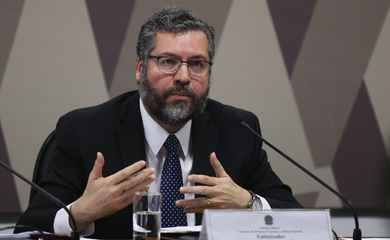Brazil advocates ties with Israel, denies losses with Arab countries


Brazilian Foreign Minister Ernesto Araújo said Monday (Apr. 8) that Brazil and Israel’s closer ties will not bring any losses to business in Arab countries. On his visit to Israel late in March, President Jair Bolsonaro unveiled a Brazilian business office in Jerusalem.

“There are no signs that our closer ties with Israel could result in commercial losses with Arab countries,” the chancellor said during a talk at the Federation of Industries of the State of São Paulo (FIESP). FIESP President Paulo Skaf stressed the need for Brazil to forge plural relations. “Good ties with the US and Israel are crucial, as well as with Arab countries and Mercosur,” he said.
“We have talked a lot with the Arab countries of the Middle East. We are certain that deep relations with Israel do not mean weaker relations with these countries,” Araújo said. He said he has held talks with the United Arab Emirates and Saudi Arabia.
“Through the Emirates, we’re starting a project to gain more access to food markets in India—a very difficult market to reach directly,” he mentioned, while talking about joint initiatives being developed with countries in the region.
Iran
Brazil is also expected to nurture good relations with Iran. “We have an important trade with Iran, and we want to keep it, expand it,” he said, adding, however, that the country’s role is a controversial one. “We’ve been hearing a lot from Iran’s neighboring countries and they are really concerned about their work in the region,” he remarked, while discussing his impressions during the Ministerial Conference on the Middle East in February, in Poland.
Brazil should work to prevent conflicts in the Middle East, Araújo went on to argue. “Brazil wants to contribute to peace and stability there. We think our steps to move closer to Arab countries may contribute to that, so we should become acquainted with their worldview and their concerns,” he said.





